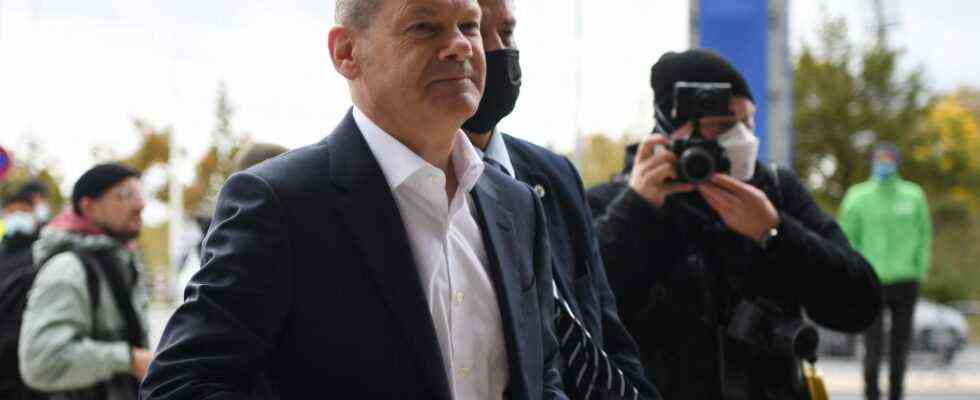analysis
As of: 10/29/2021 8:13 a.m.
Olaf Scholz no longer has to practice his new role: Even during the election campaign, he presented himself as a statesmanlike man. Finance minister, vice-chancellor – and actually already chancellor. Or?
It could simply have been a coincidence that Olaf Scholz leaned casually against the government bench before the constituent session of parliament, in front of the place that Angela Merkel has always occupied for the past 16 years. But the media professional must have known very well how many cameras are aimed at him. And also how the picture works when he chats relaxed with FDP General Secretary Volker Wissing and Greens Managing Director Michael Kellner at this very place. A look into the future, what will come as a possible government? With a Chancellor Scholz at the helm? Maybe.
No time for the subjunctive
It is certainly no coincidence that Scholz’s choice of words for the trade union IG Bergbau, Chemie und Energie was probably not a coincidence. He does mention that the coalition negotiations are actually still in progress, but then his words are clear. Without any subjunctive that could come, he makes it clear that a new government will initiate all legal changes in the first year so that there is no electricity gap in Germany for an industry of the future, for the jobs of the future. “That is exactly what we will be tackling next year,” he says in front of the unionists militantly and to applause.
He wants to tackle it as Chancellor Scholz – that is the message that he had already sent during the election campaign. He, who in the past worked a lot as a labor lawyer, sat around a table with unionists. The plans could be “uncomfortable”, so Scholz, but he verbally takes the unionists by the hand. He wants to do it with you. He’ll need her too.
Chatting in front of the government bank: Scholz and Greens managing directors Kellner in the Bundestag.
Image: REUTERS
Statesmanlike appearance
As Vice Chancellor and Minister of Finance, he knows how to appear statesmanlike and when to focus on the common. When to take a step back, not hit it.
This also became clear in the election campaign, for example at Angela Merkel’s last session of the Bundestag on September 7th. When she attacks him in her farewell speech in the Bundestag because of his statements in the pandemic, he lets her attacks run nowhere.
He refers to the economic successes in the pandemic. We got this far because we stuck together – and thanks you for the solidarity in the Federal Government, “including you, Ms. Chancellor.” It should be clear to everyone that the cooperation in the federal government was anything but easy between the Union and the SPD. But Scholz – a very level-headed tactician – demonstrates when to attack – and when not. He has shown this again and again in the shadow of Merkel on the international stage. So he’s in practice. The terrain is not unknown. And so Scholz slowly shifted up a gear, from vice to chancellor.
Thumbs up for Habeck
Scholz’s nature plays into his cards. That’s why he doesn’t let himself get upset in talk shows like “Anne Will”. For example, when it is teased how much the talk of the FDP’s victory in the coalition negotiations actually annoys him. “Not at all,” he replies briefly in Hanseatic style and stoically explains how well the negotiations are going. And when he asked Green Co-boss Robert Habeck whether Scholz was going to be a “Climate Chancellor”, Scholz just grinned mischievously and waited relaxed for Habeck’s answer. “Together we will be a good climate government,” says Habeck diplomatically. For this he gets a “thumbs up” from Scholz and a “super”. You can see from Scholz how happy he is. Almost like a class representative who is looking forward to the first day of school full of anticipation. Scholz is just before Chancellor. The resistance in the coalition negotiations currently seems low, at least that’s how it is celebrated externally.
And so Scholz lets the Chancellor shine through, the statesman who wants to campaign for Germany to develop climate-neutral technologies that are then also used by other countries. A pioneering role, so to speak, a turning point. He wants to set the tone there. All of this is social, with a minimum wage of twelve euros. A promise that he made to the voters during the election campaign and, as it looks, can now also be kept as future chancellor.
The coalition negotiators do not have much time for a substantive dispute anyway, because their plan is ambitious: In the week after Nikolaus, Scholz could be elected as Chancellor. Five more weeks. He definitely no longer needs to practice for his new role.

